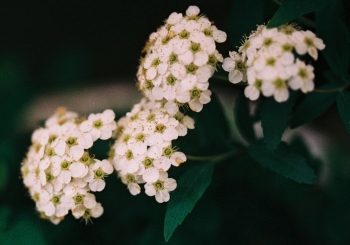想像力 2003年4月5日
 コデマリ(小手毬)/バラ科シモツケ属。中国大陸中部原産の落葉低木。日本への渡来は古く、江戸時代以前にはスズカケ(鈴懸)と呼んだ。コデマリの名前は江戸時代初期につけられた。花は白色で、7〜10ミリの五弁の小花が多数集まってほぼ球形の花序となり、枝上に連続して並ぶ。花言葉は努力する。 コデマリ(小手毬)/バラ科シモツケ属。中国大陸中部原産の落葉低木。日本への渡来は古く、江戸時代以前にはスズカケ(鈴懸)と呼んだ。コデマリの名前は江戸時代初期につけられた。花は白色で、7〜10ミリの五弁の小花が多数集まってほぼ球形の花序となり、枝上に連続して並ぶ。花言葉は努力する。
▼ インターネットを探っている中で、アメリカ・メーン州の13歳の少女が発信した次のメールが大きな反響を呼んでいることを知った。以下、転載する。
▼
What
About the Iraqi Children?
Charlotte
Aldebron,
March 3,
2003
The following is
a transcript of a speech given by now 13-year-old Charlotte Aldebron at a peace
rally in Maine.
シャーロッテ・アルデブロン(アメリカ・メーン州の13歳の少女)
When people think about bombing Iraq, they see a picture in their heads of Saddam Hussein in a military uniform, or maybe soldiers with big black mustaches carrying guns, or the mosaic of George Bush Senior on the lobby floor of the Al-Rashid Hotel with the word "criminal.
アメリカ人がイラクに爆弾を落とすことを考えるとき、頭の中を想像するのは軍服を着たサダム・フセインとか、銃をもった黒い口ひげの兵隊とか、バグダットのアルラシード・ホテルの玄関フロアに「罪人」と説明つきで描かれた父ブッシュ大統領のモザイク画とかでしょう。
" But guess what? More than half of Iraq's 24 million people are children under the age of 15. That's 12 million kids. Kids like me. Well, I'm almost 13, so some are a little older, and some a lot younger, some boys instead of girls, some with brown hair, not red. But kids who are pretty much like me just the same. So take a look at me -- a good long look. Because I am what you should see in your head when you think about bombing Iraq. I am what you are going to destroy.
でも、知っていますか? イラクに住む二四〇〇万人の人たちのうち半分以上は十五歳以下の子どもたちなんです。一二〇〇万人の子どもですよ。私と同じような子どもたちです。私はもうすぐ一三歳ですけれど、もっと大きい子たちや、もっとずっと小さい子たちいて、女の子ではなくて男の子もいるし、髪の毛は赤毛じゃなくて茶色だったりするでしょう。でも、みんな私とちっとも変わらない子どもたちです。
ですからみなさん、私をよーく見てください。イラク爆撃のことを考えるときは、頭の中で私のことを思い描いてほしいからです。皆さんが戦争で殺すのは私なんです。
If I am lucky, I
will be killed instantly, like the three hundred children murdered by your
"smart" bombs in a Baghdad bomb shelter on February 16, 1991. The blast caused a
fire so intense that it flash-burned outlines of those children and their
mothers on the walls; you can still peel strips of blackened skin -- souvenirs
of your victory -- from the stones.
もし運がよければ、私は一瞬で死ぬでしょう。一九九一年二月一六日にバグダッドの防空壕で、アメリカの「スマート」爆弾によって虐殺された三〇〇人間の子どもたちのように。防空壕は猛烈な火の海になって、その子どもたちやお母さんたちの影が壁に焼きつきました。いまでも石壁から黒い皮膚を剥ぎ取って、お土産にできるそうです。
But maybe I won't be
lucky and I'll die slowly, like 14-year-old Ali Faisal, who right now is in the
"death ward" of the Baghdad children's hospital. He has malignant lymphoma --
cancer -- caused by the depleted uranium in your Gulf War missiles. Or maybe I
will die painfully and needlessly like18-month-old Mustafa, whose vital organs
are being devoured by sand fly parasites. I know it's hard to believe, but
Mustafa could be totally cured with just $25 worth of medicine, but there is
none of this medicine because of your sanctions.
けれども、私は運悪くもっとゆっくり死ぬかもしれません。たったいまバグダッドの子ども病院の「死の病棟」にいる、十四歳のアリ・サファルのように。湾岸戦争のミサイルに使われた劣化ウランのせいで、彼は不時の白血病にかかっています。さもなければ、生後十八ヶ月のムスタファのように、内臓をサンチョウバエの寄生虫に食い荒らされて、苦しい不必要な死を迎えるかもしれません。信じられないかもしれませんが、ムスタファはたった二五ドル分の薬があれば完治するのです。でも、みなさんが押しつけている経済制裁のためにその薬がありません。
Or maybe I won't die at all but will live for years with the psychological damage that you can't see from the outside, like Salman Mohammed, who even now can't forget the terror he lived through with his little sisters when you bombed Iraq in 1991. Salman's father made the whole family sleep in the same room so that they would all survive together, or die together. He still has nightmares about the air raid sirens.
さもなければ、私は死なずに何年も生きるかもしれません。サルマン・モハドのように、外からではわからない心理学的打撃を抱えて・・・・。彼はいまでも、アメリカが一九九一年にバグダッドを爆撃したとき、幼い妹たちと経験した恐怖が忘れられないのです。サルマンのお父さんは、生きのびるにしても死ぬにしても同じ運命をと、家族全員を一つの部屋に寝かせました。サルマンはいまでも、空襲のサイレンの悪夢にうなされます。
Or maybe I will be
orphaned like Ali, who was three when you killed his father in the Gulf War. Ali
scraped at the dirt covering his father's grave every day for three years
calling out to him, "It's all right Daddy, you can come out now, the men who put
you here have gone away." Well, Ali, you're wrong. It looks like those men are
coming back.
さもなければ、三歳のとき湾岸戦争でお父さんをアメリカに殺されたアリのように、私は孤児(みなしご)になるかもしれません。アリは三年のあいだ毎日、お父さんのお墓の土を手でかき分けては、こう呼びかけていたそうです。「だいじょうぶだよ、パパ。もうパパをここに入れたやつらはいなくなったから」と。でも、それはちがったみたいね、アリ。そいつらはまた攻めていくらしいもの。
Or I maybe I will
make it in one piece, like Luay Majed, who remembers that the Gulf War meant he
didn't have to go to school and could stay up as late as he wanted. But today,
with no education, he tries to live by selling newspapers on the
street.
さもなければ、私はルエイ・マジェッドのように無事でいられるかもしれません。彼にとっては、学校へ行かなくてよくなり、夜いつまでも起きていられるのが湾岸戦争でした。でも、教育を受けそこなったルエイは、いま路上で新聞を売るその日暮らしの身の上です。
Imagine that these
are your children -- or nieces or nephews or neighbors. Imagine your son
screaming from the agony of a severed limb, but you can't do anything to ease
the pain or comfort him. Imagine your daughter crying out from under the rubble
of a collapsed building, but you can't get to her. Imagine your children
wandering the streets, hungry and alone, after having watched you die before
their eyes.
みなさんの子どもや姪や甥が、こんな目にあうのを想像してみてください。体が痛くて泣き叫ぶ息子に、何も楽になることをしてやれない自分を想像してみてください。崩れた建物の瓦礫の下から娘が助けを求めて叫ぶのに、手のとどかない自分を想像してみてください。子どものたちの目の前で死んでしまい、そのあと彼らがお腹をすかせ、独りぼっちで路上をさまようのを、あの世から見守るしかない自分を想像してみてください。
This is not an
adventure movie or a fantasy or a video game. This is reality for children in
Iraq. Recently, an international group of researchers went to Iraq to find out
how children there are being affected by the possibility of war. Half the
children they talked to said they saw no point in living any more. Even really
young kids knew about war and worried about it. One 5-year-old, Assem, described
it as "guns and bombs and the air will be cold and hot and we will burn very
much." Ten-year-old Aesar had a message for President Bush: he wanted him to
know that "A lot of Iraqi children will die. You will see it on TV and then you
will regret."
これは冒険映画や空想物語やビデオゲームじゃありません。イラクの子どもたちの現実です。最近、国際的な研究グループがイラクへ出かけ、近づく戦争の可能性によってイラクの子どもたちがどんな影響を受けているかを調べました。話を聞いた子どもの半分は、もうこれ以上生きている意味がないと答えました。ほんとに小さな子たちでも戦争のことを知っていて、不安がっているそうです。
五歳のアセムは戦争について「鉄砲と爆弾で空が冷たくなったり熱くなったりして、ぼくたちものすごく焼け焦げちゃうんだ」と語りました。一〇歳のアエサルは、ブッシュ大統領にこう伝えてほしいと言いました。「イラクの子どもが大勢死にます。あなたはそれをテレビで見て後悔するでしょう」
Back in elementary
school I was taught to solve problems with other kids not by hitting or
name-calling, but by talking and using "I" messages. The idea of an "I" message
was to make the other person understand how bad his or her actions made you
feel, so that the person would sympathize with you and stop it. Now I am going
to give you an "I" message. Only it's going to be a "We" message. "We" as in all
the children in Iraq who are waiting helplessly for something bad to happen.
"We" as in the children of the world who don't make any of the decisions but
have to suffer all the consequences. "We" as in those whose voices are too small
and too far away to be heard.
小学校のとき、友だちとの問題は叩いたり悪口を言い合ったりするのではなく、相手の身になって話し合うことで解決しましょうと教わりました。相手の行動によって自分がどう感じるかをその子に理解してもらうことで、その行動をやめさせるというやりかたです。
ここで、みなさんにも同じことをお願いします。ただし、この場合の「相手」とは、いま何かひどいことが起ころうとしているのを待つしかないイラクの子どもたち全部です。ものごとを決められないのに、結果はすべてかぶらなければならない世界中の子どもたちです。声が小さすぎたり遠すぎたりして、耳をかしてもらえない人たちのことです。
We feel scared when
we don't know if we'll live another day.
そういう「相手」の身になれば、もう一日生きられるかどうかわからないのは恐ろしいことです。
We feel angry when
people want to kill us or injure us or steal our future.
ほかの人たちが自分を殺したり、傷つけたり、自分の未来を奪ったりしたがったら、腹が立つものです。
We feel sad because
all we want is a mom and a dad who we know will be there the next
day.
ママとパパが明日もいてくれることだけが望みだなんて、悲しいです。
And, finally, we feel confused -- because we don't even know what we did wrong.
そして最後に、どんな自分が悪いことをしたのかも知らないので、何がなんだかわかりません。
Charlotte Aldebron, 13, attends Cunningham Middle School in Presque Isle,
Maine. Comments may be sent to her mom, Jillian Aldebron.
|
 コデマリ(小手毬)/バラ科シモツケ属。中国大陸中部原産の落葉低木。日本への渡来は古く、江戸時代以前にはスズカケ(鈴懸)と呼んだ。コデマリの名前は江戸時代初期につけられた。花は白色で、7〜10ミリの五弁の小花が多数集まってほぼ球形の花序となり、枝上に連続して並ぶ。花言葉は努力する。
コデマリ(小手毬)/バラ科シモツケ属。中国大陸中部原産の落葉低木。日本への渡来は古く、江戸時代以前にはスズカケ(鈴懸)と呼んだ。コデマリの名前は江戸時代初期につけられた。花は白色で、7〜10ミリの五弁の小花が多数集まってほぼ球形の花序となり、枝上に連続して並ぶ。花言葉は努力する。